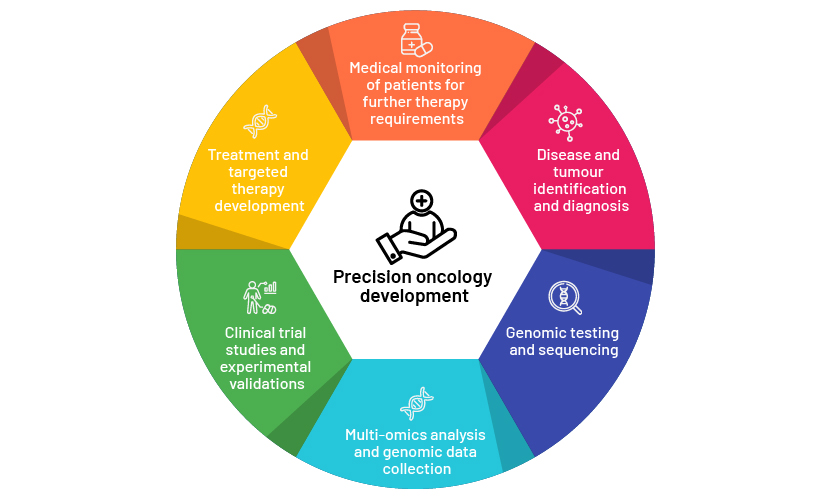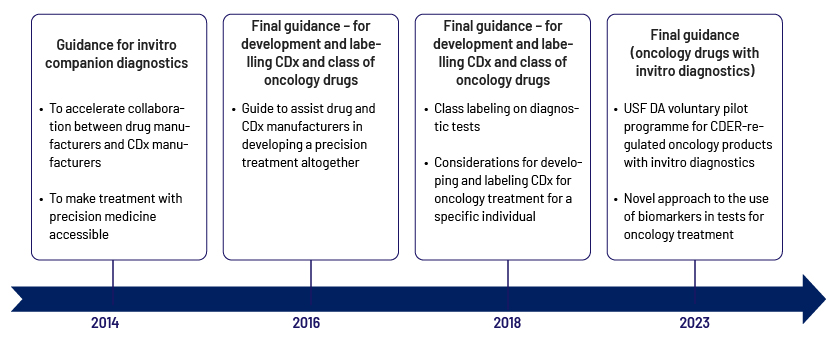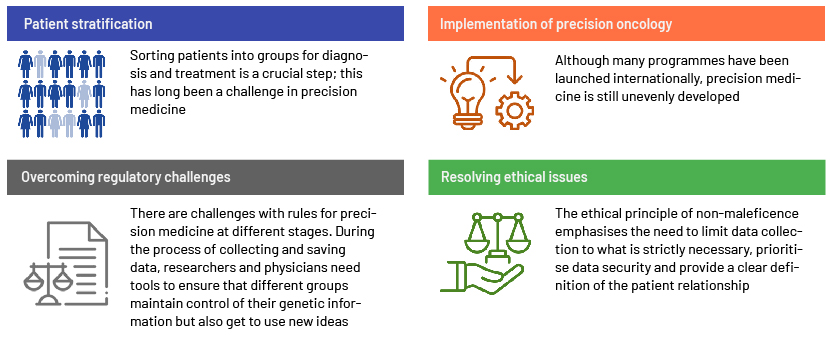Published on April 18, 2024 by Amit Kumar
Precision medicine
The healthcare and life sciences sectors are currently undergoing a paradigm shift to more precise treatment to prevent disease. Instead of treating the disease, doctors are moving to treat the individual patient, based on a personal information-oriented approach. According to the US Food & Drug Administration (FDA), “precision medicine” is an innovative approach to tailoring disease prevention and treatment considering differences in people's genes, environments and lifestyles. Precision medicine aims to target the right treatment for the right patient at the right time. The reason for this change is the convergence of big data (big data in genomics is the application of big-data analytics to the large-scale study of the structure and function of genomes, which are the complete sets of genetic material in an organism) and omics (this refers to the various fields of biology that study the collective structure and function of biological molecules or processes). Precision medicine has emerged as a computational approach to the functional interpretation of omics and big data and their application in healthcare.
Conventional oncological treatment vs precision oncology
There are four main ways to treat cancer: surgery, radiation, chemotherapy and immunotherapy. Some patients only need one form of treatment, but usually, a combination of treatments is used. Surgery can be used for tumours that have not spread and are accessible, but many cancers do spread, so stronger treatments such as radiation and chemotherapy are necessary. These methods use strong radiation and drugs to kill cancer cells and make tumours smaller but can also harm healthy cells. The adequacy of these therapies relies on a number of singular elements, such as the type, stage and area of the malignant growth, and the patient's age and general wellbeing. Therefore, a number of individual elements need to be considered before choosing a cancer treatment. Another class of disease therapies that has been prepared for additional particular and successful treatment is immunotherapy; this uses pieces of a patient's insusceptible framework to battle malignant growth. Immunotherapies incorporate monoclonal antibodies (mAbs), checkpoint inhibitors, cytokines, mRNA vaccines, etc.
Precision oncology refers to the study of the tiny details of tumours to find genetic changes that can be targeted with treatments. Genetic testing needs a number of individuals to cooperate to get good tissue samples to good labs. Research labs use next-generation sequencing (NGS) to get results that can lead to a precise treatment. Doctors need to know how the lab figures out what kind of genes a person has and what the results mean. They should also know the factors that can make the test results not as accurate. For example, non-small-cell lung cancer is a type of disease where it is important to have genetic information about specific changes in the body to treat it properly. This information helps determine the best treatment for the advanced stage of the disease. As diseases progress, conventional treatments become less effective, and it may be necessary to test the tumour again using new technology to decide on the best treatment. As methods improve and become cheaper, using molecular testing may help more patients with specific problems and improve their results.

Use of biomarkers in precision oncology
Biomarkers are specific markers in the body that can help understand and treat the disease. Patients can be grouped based on how well they respond to treatments. This information can help doctors choose better treatments for patients and decide on who will benefit the most from these treatments. Cancer is unstable in its genetic makeup and, therefore, differs from patient to patient. This is why patients with the same type of cancer can have different outcomes and responses to treatment. Oncologists use biomarkers to provide patients with personalised treatment.
Use of companion diagnostics in precision oncology
In cancer treatment, companion diagnostics (CDxs) are usually used with one drug, but the FDA is now promoting the use of CDx with a group of related drugs that target the same mutations, to help patients more. The FDA has approved labelling for a group of related drugs that treat patients with the same genetic mutation. This means that doctors would not have to order multiple tests to find the same mutation. This is helpful for patients with cancer and a certain genetic mutation and ensures that the patient is treated quickly. The FDA has ruled that each drug must be evaluated with at least one device to make sure it works. Customising treatments for patients has helped make cancer treatments more successful, but it is also a challenge because new drugs are being developed faster than the tests used to match them to patients.

Therapeutic agents used in precision oncology.
Herceptin is a classic example of precision treatment in HER2+ breast cancer patients. The advancements in research on single molecules or how cells interact with each other show that some drugs are more effective than others in the same category. Keytruda and Opdivo are examples of other drugs used as precision treatment across multiple indications. CAR-T cell therapy is a precise treatment that takes the patient's immune cells, changes genes to help them fight cancer better and then puts them back into the patient's body. Antibodies and drugs that block cell signals are some of the best cancer treatments. However, not every drug fits into these groups the same way. Some therapeutic antibodies block a protein in cancer cells to stop their growth, and some find and kill cancer cells by carrying medicine to them (TDM-1). Doctors are using new treatments such as immunotherapy and targeted therapy to change how they treat cancer. These treatments provide different ways to help patients with the disease. However, there are several issues that still need to be resolved before cancer can be fully controlled. Some tumour cells can stay alive after treatment and become resistant to drugs. In addition, there are factors other than genes that can affect how well a treatment works. The FDA has approved c.241 treatments for cancer since 2020, such as Tecartus (brexucabtagene autoleucel) for adult patients with relapsed or refractory B-cell precursor acute lymphoblastic leukaemia and Jakafi (ruxolitinib) for the treatment of high-risk myelofibrosis.
Case studies
1. Use of a precision oncology platform in treatment-resistant malignancies
Researchers from Columbia University conducted a study in 2023 to test two new methods for predicting how well tumours respond to different cancer drugs. They looked at how the drugs work in cells to check whether the methods were accurate. Patients with different types of cancers who were not expected to get better and had not improved after a number of treatments were used to create models to test 35 different drugs specific to each patient. OncoTarget and OncoTreat were computational strategy platforms used for the analysis. They both found drugs that control disease very well, with 68% and 91% success rates in 30 days, respectively. OncoTarget found drugs that stop master regulator proteins, while OncoTreat found drugs that reverse the activity of these proteins. Furthermore, of 18 drugs predicted by OncoTreat, 15 caused the expected change in activity in the MR module. This shows that these methods could add to the current ways of treating cancer more accurately.
2. Immunotherapy combination – for BRAF+melanoma
Results of the NCI-sponsored clinical trial, DREAMseq, were published in 2021. This was a study of patients with advanced melanoma whose tumours had a certain change in the BRAF gene (V600). First, doctors gave the patients two immunotherapy drugs, called ipilimumab (Yervoy) and nivolumab (Opdivo), or two targeted therapy drugs, called dabrafenib (Tafinlar) and trametinib (Mekinist). For both groups of patients, when the first treatment did not work anymore, they changed to a different treatment. More patients first treated with immunotherapy drugs survived two more years than did patients first treated with targeted combination therapy (72% vs 52%). Both drug combinations are effective in patients with advanced melanoma. However, for about 50% of those whose melanoma has the BRAF V600 mutation, researchers do not know which combination of treatments to use first. With this study, researchers have an effective solution for patients with a V600 gene mutation.
Current challenges in the development of precision oncology

Outlook and what to expect in 2024 and beyond
Doctors now have new ways to study and identify different kinds of cancer because of progress in molecular technologies. Scientists have found new ways to help patients respond better to treatment and reduce safety concerns. However, it would take far more time for all cancer patients to get the exact medicine they need. All researchers in precision oncology would need to work together to align the treatments and understand important findings for analysing biomarkers. It would also help to compare information from different medical research. Although doctors can test patients in different ways, some tests may not be useful or practical for every patient. It is important to ensure that patients undergo the right test at the right time. Oncologists need to do more work to make sure that all patients with different types of cancer get the right tests and treatments. This means looking for new ways to treat cancers that are difficult to treat. Continued discussions between experts, scientists and doctors would help develop precision oncology for a broader group of patients. This would be possible only if researchers have a better understanding of molecular methods and how they are used. Uniform alignment between all stakeholders in precision oncology would help discover new medicines, identify illnesses and improve treatment choices.
Conclusion
Precision oncology has the potential to improve clinical outcomes and quality of life for cancer patients, as well as reduce the costs and side effects of cancer therapies. However, it also faces many challenges, such as the need to identify more molecular targets, increase the accessibility and affordability of treatments and address disparities in health issues and ethical issues associated with this approach. Precision oncology can reduce R&D costs and increase the ROI of oncology drugs, using companion diagnostics to select the most suitable patients for clinical trials and therapies. It could also use real-world data, such as electronic health records, to test the effectiveness and safety of treatments in diverse and representative populations. It could have a broader impact on cancer care if it also considers other molecular factors beyond the cancer genome, such as RNA and proteins, and integrates them into clinical and environmental data.
How Acuity Knowledge Partners can help
We are a leading provider of high-value research, analytics and business intelligence services to life sciences, biopharma, medtech and healthcare consulting firms.
We provide bespoke research support on market entry and due diligence, portfolio management, licensing and acquisition, go-to-market strategy, opportunity assessment, regulatory landscaping, product launch analysis, market access, therapy-area assessment, indication prioritisation, market research and forecasting, pipeline analysis, and benchmarking and competitive intelligence.
Sources:
-
Precision Medicine: A New Paradigm in Therapeutics – PMC (nih.gov)
-
IJMS | Free Full-Text | The Future of Precision Oncology (mdpi.com)
-
What Is Precision Medicine? – American Association for Cancer Research (AACR)
-
Examining the Potential of Precision/Personalized Medicine (pharmasalmanac.com)
-
Precision medicine: overcoming cost challenges – PharmaTimes
-
New approaches and procedures for cancer treatment: Current perspectives – PMC (nih.gov)
-
Precision Oncology Market Size To Surpass USD 258.35 Bn By 2032 (precedenceresearch.com)
-
FDA Approves Ivosidenib to Treat Myelodysplastic Syndromes With IDH1 Mutation (oncnursingnews.com)
-
Overview of Companion Diagnostics and its Regulatory Trends in Asia Pacific – IQVIA
-
Oncology (Cancer) / Hematologic Malignancies Approval Notifications | FDA
-
Immunotherapy Combination for BRAF+ Melanoma – NCI (cancer.gov)
Tags:
What's your view?
About the Author
Amit Kumar has more than five years of experience in pharma and healthcare consulting and advisory services. As a member of the Life Sciences Consulting Team at Acuity Knowledge Partners (Acuity), he provides healthcare corporate and consulting clients with scientific, clinical and commercial insights. He is proficient in primary-/secondary-market research, competitive intelligence, market assessment, opportunity assessment, therapy-area assessment, clinical trial analysis and scientific conference coverage.
Prior joining Acuity, Amit Kumar worked for Johnson & Johnson and ZS Associates, where he was responsible for ICSR management and secondary-market research, respectively.
Like the way we think?
Next time we post something new, we'll send it to your inbox







